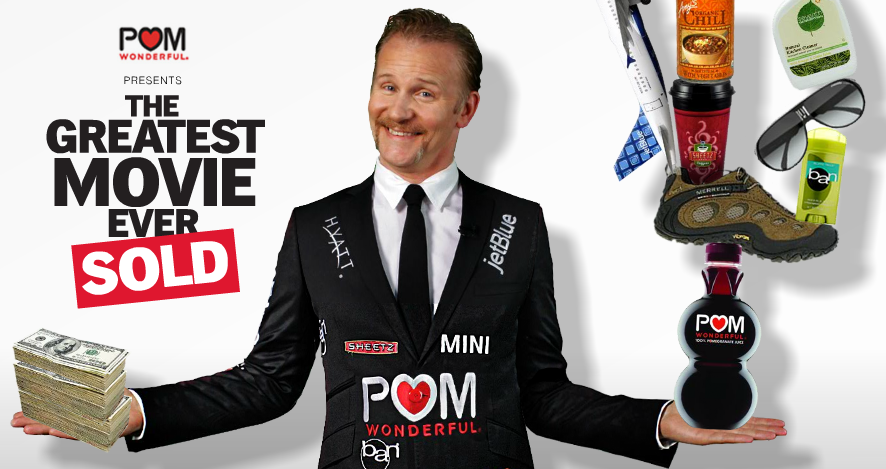The Pervasiveness of Product Placement: A Review of Spurlock's New Film
by Amy Curtis | November 17, 2011

Earlier this year, Morgan Spurlock, of Supersize Me fame, released a new film exposing the subversive role of product placement in American media. Interesting, but not independent documentary iconic? A twist, you wonder? Well, of course.
The very film that slanders brand sponsors also is entirely funded by them. POM Wonderful Presents: The Greatest Movie Ever Sold critiques media’s infiltration by layering scenes of Spurlock attempting to get companies to infiltrate his film. While humorous and often seemingly absurd, the film showcases a troubling reality: advertising permeates all our lives.
One of the most concerning arenas of advertising’s intrusion is public education. When Spurlock documents how schools sell advertising to raise money for ailing programs and facilities, we question the ramifications of the practice. Besides the dangers of sending inappropriate messages to students about the value of products as they head off to learn, one cannot help but contemplate the financial status of our public schools. How much are they struggling if they must resort to selling ad space on buses for just $1,000?
The effect of schoolbus advertising on young students hasn’t been fully documented, but it’s hard to deny that young people are easily influenced. Being bombarded with images of video games or unhealthy foods affects students’ understanding of what’s important. Instead of math, it’s Kraft macaroni. Instead of American History, it’s the Old Navy Spring Collection.
So what does Spurlock advocate? While at times the film is light on substantive advice, it does promote the importance of transparency. Spurlock believes Americans should be better informed about what they watch and understand who’s influencing the messages that are being promoted. Knowing the ulterior motives of companies can ensure that audiences will be more educated consumers.
Advertising has actual effects on our brain. The film highlights psychological tests that demonstrate areas in the brain that are stimulated by media’s messages. These stimulations have the potential to alter our belief in what provides happiness. With the constant abrasive and subtle bombardment of ads, it’s nearly impossible to be persuaded that products and purchasing goods will not provide pleasure. We begin to subconsciously feel the need to own material goods.
In the current economic and environmentally degrading times, this message certainly causes harm. While The Greatest Movie Ever Sold might not be the next Oscar winner, behind the seeming shenanigans of Spurlock, one can’t help but want to think more critically about the subconscious messages being disseminated in America media. And for that alone (and a few laughs along the way), the 90 minutes of the film are worth your while.
View the film trailer here.
Amy Curtis is a student at the University of Virginia and an intern at New Dream.

